Related Research Articles

Albert Einstein was a German-born theoretical physicist who is widely held as one of the most influential scientists. Best known for developing the theory of relativity, Einstein also made important contributions to quantum mechanics. His mass–energy equivalence formula E = mc2, which arises from special relativity, has been called "the world's most famous equation". He received the 1921 Nobel Prize in Physics for "his services to theoretical physics, and especially for his discovery of the law of the photoelectric effect".

Leon Max Lederman was an American experimental physicist who received the Nobel Prize in Physics in 1988, along with Melvin Schwartz and Jack Steinberger, for research on neutrinos. He also received the Wolf Prize in Physics in 1982, along with Martin Lewis Perl, for research on quarks and leptons. Lederman was director emeritus of Fermi National Accelerator Laboratory (Fermilab) in Batavia, Illinois. He founded the Illinois Mathematics and Science Academy, in Aurora, Illinois in 1986, where he was resident scholar emeritus from 2012 until his death in 2018.
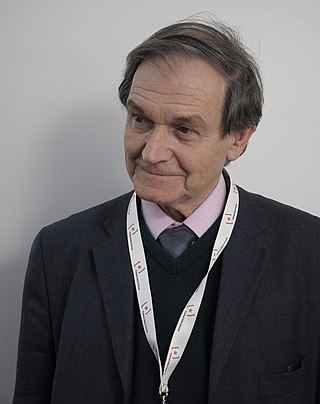
Sir Roger Penrose is a British mathematician, mathematical physicist, philosopher of science and Nobel Laureate in Physics. He is Emeritus Rouse Ball Professor of Mathematics in the University of Oxford, an emeritus fellow of Wadham College, Oxford, and an honorary fellow of St John's College, Cambridge, and University College London.

Thomas Alva Edison was an American inventor and businessman. He developed many devices in fields such as electric power generation, mass communication, sound recording, and motion pictures. These inventions, which include the phonograph, the motion picture camera, and early versions of the electric light bulb, have had a widespread impact on the modern industrialized world. He was one of the first inventors to apply the principles of organized science and teamwork to the process of invention, working with many researchers and employees. He established the first industrial research laboratory.

Stephen Reeder Donaldson is an American fantasy, science fiction and mystery novelist, most famous for The Chronicles of Thomas Covenant, his ten-novel fantasy series. His work is characterized by psychological complexity, conceptual abstractness, moral bleakness, and the use of an arcane vocabulary, and has attracted critical praise for its "imagination, vivid characterizations, and fast pace". Donaldson earned his bachelor's degree from The College of Wooster and a master's degree from Kent State University. He currently resides in Albuquerque, New Mexico.

Leon Marcus Uris was an American author of historical fiction who wrote many bestselling books, including Exodus and Trinity.
TRIZ combines an organized, systematic method of problem-solving with analysis and forecasting techniques derived from the study of patterns of invention in global patent literature. The development and improvement of products and technologies in accordance with TRIZ are guided by the laws of technical systems evolution. Its development, by Soviet inventor and science-fiction author Genrich Altshuller and his colleagues, began in 1946. In English, TRIZ is typically rendered as the theory of inventive problem solving.
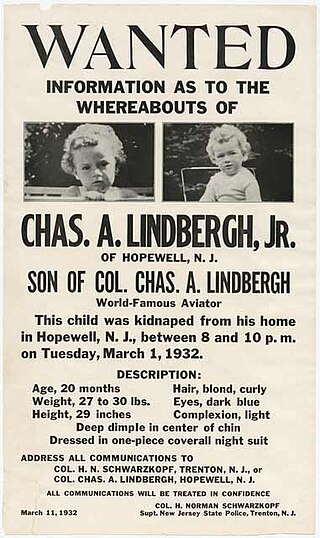
On March 1, 1932, Charles Augustus Lindbergh Jr., the 20-month-old son of colonel Charles Lindbergh and his wife, aviatrix and author Anne Morrow Lindbergh, was murdered after being abducted from his crib in the upper floor of the Lindberghs' home, Highfields, in East Amwell, New Jersey, United States. On May 12, the child's corpse was discovered by a truck driver by the side of a nearby road.
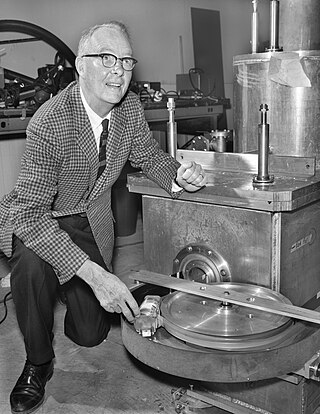
Luis Walter Alvarez was an American experimental physicist, inventor, and professor who was awarded the Nobel Prize in Physics in 1968 for his discovery of resonance states in particle physics using the hydrogen bubble chamber. In 2007 the American Journal of Physics commented, "Luis Alvarez was one of the most brilliant and productive experimental physicists of the twentieth century."
The year 1863 in science and technology involved some significant events, listed below.

Tennis for Two is a sports video game that simulates a game of tennis, and was one of the first games developed in the early history of video games. American physicist William Higinbotham designed the game in 1958 for display at the Brookhaven National Laboratory's annual public exhibition after learning that the government research institution's Donner Model 30 analog computer could simulate trajectories with wind resistance. He designed the game within a few hours, after which he and technician Robert V. Dvorak built it over a period of three weeks. The game was displayed on an oscilloscope and played with two custom aluminum controllers. Its visuals show a representation of a tennis court viewed from the side, and players adjust the angle of their shots with a knob on their controller and try to hit the ball over the net by pressing a button.

Alister Edgar McGrath is a Northern Irish theologian, Anglican priest, intellectual historian, scientist, Christian apologist, and public intellectual. He currently holds the Andreas Idreos Professorship in Science and Religion in the Faculty of Theology and Religion, and is a fellow of Harris Manchester College at the University of Oxford, and is Professor of Divinity at Gresham College. He was previously Professor of Theology, Ministry, and Education at King's College London and Head of the Centre for Theology, Religion and Culture, Professor of Historical Theology at the University of Oxford, and was principal of Wycliffe Hall, Oxford, until 2005.
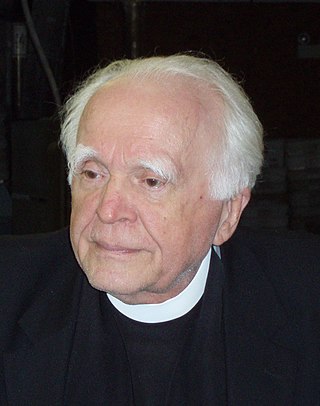
Stanley L. Jaki was a Hungarian-born priest of the Benedictine order. From 1975 to his death, he was Distinguished University Professor at Seton Hall University, in South Orange, New Jersey.

Mark Eugene Russinovich is a Spanish-born American software engineer and author who serves as CTO of Microsoft Azure. He was a cofounder of software producers Winternals before Microsoft acquired it in 2006.
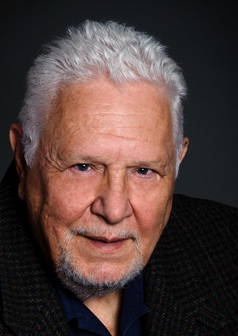
Victor John Stenger was an American particle physicist, philosopher, author, and religious skeptic.
Stephen Richard Prothero is an American scholar of religion. He is the C. Allyn and Elizabeth V. Russell Professor Emeritus of Religion in America at Boston University and the author or editor of eleven books on religion in the United States, including the New York Times bestsellerReligious Literacy.
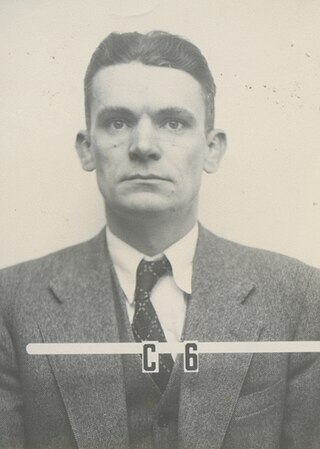
Charles Louis Critchfield was an American mathematical physicist. A graduate of George Washington University, where he earned his PhD in physics under the direction of Edward Teller in 1939, he conducted research in ballistics at the Institute for Advanced Study in Princeton and the Ballistic Research Laboratory at the Aberdeen Proving Ground, and received three patents for improved sabot designs.
Michael J. Kuhar, is an American neuroscientist, author, and Candler Professor of Neuropharmacology at The Emory National Primate Research Center of Emory University. He is a Georgia Research Alliance eminent scholar, and a senior fellow in the Center for Ethics at Emory. He was previously a professor at Johns Hopkins University School of Medicine and branchchief at the National Institute on Drug Abuse.
References
- ↑ "Literary Salon: Ransom Stephens". 26 June 2010.
- ↑ "Archived copy" (PDF). Archived from the original (PDF) on 2005-12-16. Retrieved 2024-12-16.
{{cite web}}: CS1 maint: archived copy as title (link) - ↑ Karp, Evan (2010-01-23). "Hoppe's History of the World: Unexpurgated Version". The San Francisco Chronicle. Archived from the original on May 23, 2010.